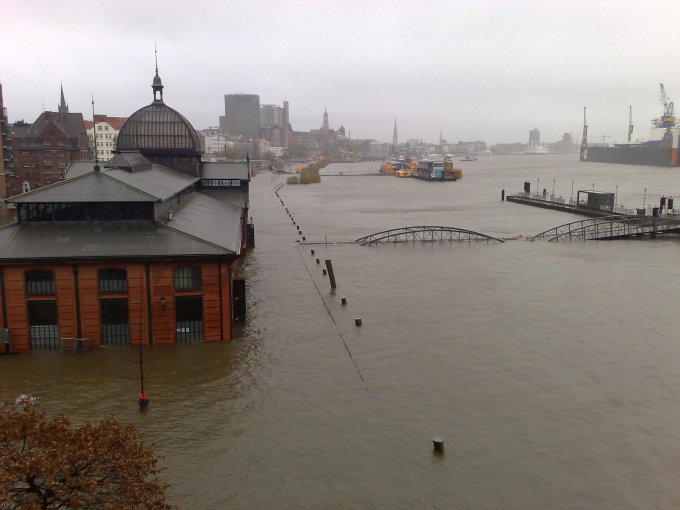Storm Surges Congress 2010 – Scientists from 30 countries meet in Hamburg
The Institute for Coastal Research at the GKSS Research Centre Geesthacht, in cooperation with Hamburg KlimaCampus (Climate Campus) at Hamburg University and further national and international partners, is hosting the international “Storm Surges Congress 2010” from 13 to 17 September at the University of Hamburg. The Congress is organized through the global Earth system research project "Land-Ocean Interactions in the Coastal Zone" (LOICZ), that investigates changes to coasts and the social consequences worldwide.
Cooperation across borders and disciplines is essential

Photo: HZG/ Christian Meyer
Storm surges are destructive. They regularly lead to casualties and substantial economic damages. In 2008 Myanmar in the Indian Ocean was hit by the tropical cyclone Nargis and the associated storm surge left a trail of destruction. More than 100.000 people lost their lives. In 1953 and 1962, the Netherlands, England, and Hamburg were severely affected by storm surges.
It is the goal of the Storm Surges Congress to support the exchange of knowledge and experiences in handling storm surges through a global dialogue between representatives from science, economics, public institutions and politics.
Academics from 30 countries will present perspectives from the natural and social sciences, and illuminate regional aspects of storm surges. Central questions of the Congress will address the predictability of storm surges as well as further developments of possible protective and mitigation measures.
Storm surges – Research for the Future
Through the effects of climate change and extensive human use of coastal areas, storm surge risks could rise worldwide. By means of mathematic models, GKSS coastal researchers have investigated what effect the constantly increasing amount of greenhouse gases in the atmosphere could have on storm surges along the North Sea Coast.
“Between 2070 and 2100 rises in maximum storm water levels in the range of three to eleven decimeters are conceivable along the entire German North Sea coast”, Professor Hans von Storch, Director of the GKSS Institute for Coastal Research, explains.
Up to 2030, the existing concepts for coastal protection in northern Germany should remain as effective as they are today. By the end of the century, however, rising storm surge levels could require action.
“Recent predictions of the OECD assume that the risk of being hit by a so called one in hundred years flood will be multiplied for large harbor cities worldwide by the year 2070”, says Professor Robert Nicholls from the University of Southampton. “This could mean that the number of humans threatened worldwide could rise from about 40 million to 150 million; additionally, possible economic losses will bring significant challenges to society.”
During the Hamburg Congress, researchers from Boulder University in Colorado will explain that particularly cities in delta regions of rapidly developing economic areas in the tropics and subtropics could be affected by future storm surges. Increasing urbanization raises the risk of storm surges. This is due to subsidence in the course of massive extractions of ground water and sand as well as the damming of rivers and streams.
The European Space Agency ESA will make a presentation at the “Storm Surge Congress” in Hamburg on how the prediction of storm surges could be improved with the help of satellite technology.
